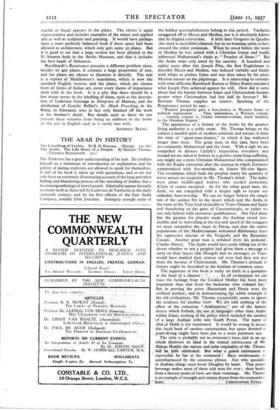THE ARAB IN HISTORY
The Unveiling of Arabia. By R. H. Rieman. (Harrap. I2S. 6d.) The Arabs. The Life Story of a People. By Bertram Thomas. (Thornton Butterworth. 2 IS.)
MR. KIERNAN has a great understanding of his task. He confines himself to a minimum of introduction or explanation and his gallery of daring explorers are allowed to speak for themselves. A half of his book is taken up with quotations, and so we not only have an extremely illuminating account of the long and often halting and blundering process of the unveiling of Arabia, but a fascinating anthology of travel record. Admirable appear the early
accountsitich is those left by Ludovico de Varthema in the early
sixteenth century, and by the first officers of the East India Company, notably John Jourdain. Strangely enough some of the boldest accomplishments belong to this period. Varthema -swaggered off to Mecca and Medina, nor is it absolutely ktiown that he feigned conversion. A little later Gregorio da Quadras . (his story is incredible) claimed, but in no boasting spirit, to have
crossed the entire- peninsula. When he stood before the tomb in Medina he was seized. with a 'Christian frenzy and loudly addressed Muhammad's shade as "Prophet of Satan ! " But
the Arabs were only awed by his sanctity. A hundred and eighty years After this Joseph Pitts, the first Englishman to describe Mecca and Medina, was induced verbally and finally with whips to profess Islam and was then taken by his pious Moslem master on the pilgrimage. It is interesting to consider with what difficulty BUrckhadt Burton or Eldon Rutter emulated what Joseph Pitts achieved against his will. How did it come about that the barrier between Islam and Christendom became greater when Christendom had lost half its fervour ? Mr. Bertram Thomas supplies an answer. Speaking of the Renaissance period he says :
"Western prosperity gave a benediction to Western forms of political organisation . . . Thin nationalism, a Western concept . . . running counter to Islamic internationalism, made headway in the Ottoman Empire."
The appearance of a history of the Arabs by the greatest living authority is a noble event. Mr. Thomas brings to the subject a needed spirit of modern criticism and rescues it from
the mire of "great-man-history," in which it has wallowed
longer than most. The great men, in this case, have been pre-eminently Muhammad and the Arab. With a sigh we are compelled to dismiss Carlyle's stupendous evocation, and
inste.a_d_we are asked to believe iii a gentler, morelong-suffering, one might say a more Christian Muhammad who compromised with the Kaaba soineWhat after the marines in which ZorOaster . compromised with fire-worship, an honest life-size ,figure.
. The revelations which bade the prophet many his quantity.of wives arouse no suspicion in Mr. Thoniat's Mind: The ladies were pious middle-aged widows who needed protection, . A'isha of course excepted. As for the other great man, the Arab, we are compelled with a deeper sigh to recant our • orthodox hero-worship. We can no longer believe the simple tale of the sudden fire in the desert which sem the Arab_s_, in the name of the True God invincible to Trans-Oxiana and Spain and thundering on the gates of Constantinople, or rather we can only believe with enormous qualifications. Not God alone but the passion for plunder made the Arabian sword irre- sistible, and in marvelling at the size and speed of the conquest we must remember the chaps in Persia, and„that the native populations of the Mediterranean welcomed deliierance from the oppressive misrule of the Visigoths and the Byzantine
Caesars. Another great man is rebuked from hit. pedestal : Charles Martel The Arabs would have conic riding-out of the desert whether or not a prophet had given them a message to carry on their lances (the 'Mongols had no message), so Tours would have inariced their utmost iail even had they not met there the Saviour of Christendom. Mr. Thomas's attitude to
history might be described as the fatalism of common sense.
The argument of this book is really set forth in a quotation at the head of a chapter : . . . In all ciyilisatiOni we can trace the heritage from the 'Civilised Mother has been more important than that - from' the-barbarian- Who violated' her."
But in proving the point_ (Byzantitnri arid _ Persia were the civilised mother), and in demonstrating_the subtle triumph of the old civilisations, Mr:. Thomas occasionally seen-is to ignore the evidence for—another Viea. We'lie told nothing of the effect of the .conscious `! Aribisilicinsi" nor of the famous decree which forbade the-use cif zlanguages other than Arabic within Islam, nothing Of the policy which included the sending of a large Arabian tribe into Smith Persia. • The name of
AM al Malik is not mentioned. It Would be wrong ió accuse this lucid book of careless construction,--but space devioted tc pearl-diving might have been put to a more pertinent use. The _style is probably not to eVeryone's -taste, and in an age
whioh disdovers its "Ideal in the eternal adolescence of Mr. Aldoits Huxley the mature and 'calm originality of Mr. Thomas *ill be little Celebrited. But- what -a _grand instrument oi eXpressloh he has -at his comniand ! -Racy modernisms si( unembarrassed by the sonorous phrase. Any who specialise in Arabian things must know Doughty by heart. That potent
beverage makes most of them sick men for ever ; their books. from a literary point of view, are their vomitings. Mr. Thoma is an example of strength and stature drawn from the tremendou,
























































 Previous page
Previous page